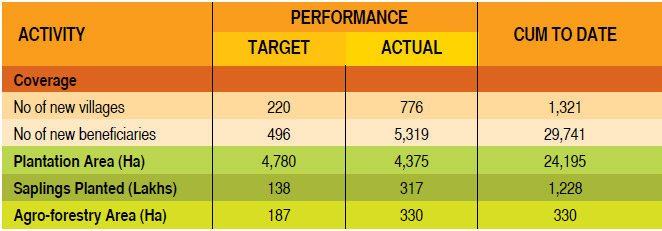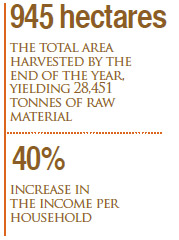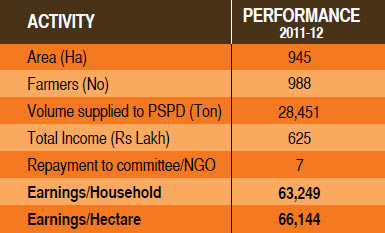Social Performance
Social Investments - Mission Sunhera Kal
In pursuit of the Company’s commitment to create larger societal value, ITC’s Social Investments Programme continues to be driven by the needs and concerns of two important stakeholders: The rural households aligned to our Agri Businesses and families residing in the vicinity of our factories. Out of the total, 67 projects covered rural households in the catchments of Agri Businesses, with a focus mainly on interventions to strengthen and broad-base their livelihood options. The balance 34 projects covered households in the command areas of our factories, mainly concentrating on farm and non-farm livelihoods through micro-enterprises and the creation of social capital.
e-Choupal
Social investment programme
ITC’s social investment programmes are guided by the company’s CSR policy, which focuses on aligning and integrating with the business value chains of the Company, and making them outcome oriented. The projects promoted under the Social Investments programme increased from 76 in the last financial year to 101 this year. Covering over 4.37 lakh households from about 8,710 villages, the projects were spread across 60 districts in the states of Andhra Pradesh, Bihar, Karnataka, Kerala, Madhya Pradesh, Maharashtra, Rajasthan, Tamil Nadu, Uttar Pradesh, and West Bengal.
Wasteland Development - Social Forestry
The Social Forestry Programme to promote pulpwood plantations in Andhra Pradesh and energy security in Karnataka, cumulatively covered a total of 24,195 hectares in 1,321 villages impacting nearly 30,000 poor households. Apart from increasing bio-mass cover, these initiatives have a salutary effect on agricultural production by preventing soil erosion and recharging groundwater, meeting the energy and fodder needs of households, and also becoming a sustainable base of raw material for our Paperboards and Paper Business. Energy plantations were promoted in four districts of Karnataka - Chamrajnagar, Mysore, Hassan and Mandya. Considering that this is a new project area, it was encouraging to note a 50% increase over the previous year to 528 hectares in 2011-12.
 |
 |
The introduction of the agro-forestry model was a significant milestone that was achieved during the year, along with the successful completion of the Forest Stewardship Council – Forest Management (FSC-FM) Certification audit. The audit was conducted in November 2011 by a team appointed by the Rainforest Alliance, the nodal agency for the FSC certification. The auditors visited the field sites to see the plantations, interacted with the beneficiaries and also saw the watershed interventions.
 Another important development during the year was the piloting of a biodiversity conservation project in Khammam district under which about 50,000 seedlings of native tree species were planted and a plot for in-situ conservation of biodiversity developed. This plot is spread across 2.75 hectares and has a floral population of 35 different species.
Another important development during the year was the piloting of a biodiversity conservation project in Khammam district under which about 50,000 seedlings of native tree species were planted and a plot for in-situ conservation of biodiversity developed. This plot is spread across 2.75 hectares and has a floral population of 35 different species.
The total area harvested by the end of the year was 945 hectares, yielding 28,451 tonnes of raw material, all of which was supplied to ITC’s Paperboards & Specialty Papers business. A significant development was the increase of nearly 40% in the income per household and per hectare as compared to the previous years. This was a result of increase in yields per hectare between the two years – from 23 tonnes/hectare to 30 tonnes/hectare as a result of the productivity enhancement measures introduced last year.